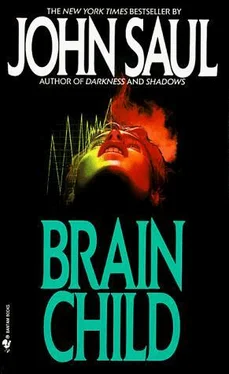John Saul - Brain Child
Здесь есть возможность читать онлайн «John Saul - Brain Child» весь текст электронной книги совершенно бесплатно (целиком полную версию без сокращений). В некоторых случаях можно слушать аудио, скачать через торрент в формате fb2 и присутствует краткое содержание. Год выпуска: 1985, ISBN: 1985, Издательство: Random House, Inc., Жанр: Ужасы и Мистика, на английском языке. Описание произведения, (предисловие) а так же отзывы посетителей доступны на портале библиотеки ЛибКат.
- Название:Brain Child
- Автор:
- Издательство:Random House, Inc.
- Жанр:
- Год:1985
- ISBN:978-0-30776793-6
- Рейтинг книги:5 / 5. Голосов: 1
-
Избранное:Добавить в избранное
- Отзывы:
-
Ваша оценка:
- 100
- 1
- 2
- 3
- 4
- 5
Brain Child: краткое содержание, описание и аннотация
Предлагаем к чтению аннотацию, описание, краткое содержание или предисловие (зависит от того, что написал сам автор книги «Brain Child»). Если вы не нашли необходимую информацию о книге — напишите в комментариях, мы постараемся отыскать её.
Brain Child — читать онлайн бесплатно полную книгу (весь текст) целиком
Ниже представлен текст книги, разбитый по страницам. Система сохранения места последней прочитанной страницы, позволяет с удобством читать онлайн бесплатно книгу «Brain Child», без необходимости каждый раз заново искать на чём Вы остановились. Поставьте закладку, и сможете в любой момент перейти на страницу, на которой закончили чтение.
Интервал:
Закладка:
“We’ve already had the miracle,” Torres replied. “And I’m not through yet. But I think you have to face the fact that Alex is probably never going to be the same as he was before.”
“I don’t expect him to be,” Marsh said evenly, determined that today he would keep his dislike of Torres under control. “I’ll be honest — I never expected him to come as far as he has.”
Torres shook his head. “Some of it may be deceiving. There are still enormous gaps in his memory, and when he leaves here, he may become completely disoriented. He says he doesn’t remember what La Paloma looks like, or how to get to his house.”
“We’ll get him there,” Marsh said. “Anyway, we’ll try,” he added, grinning ruefully. “I’m afraid I still go to the old place a couple of times a week. But I’m getting better.”
Torres didn’t respond to Marsh’s grin. “Actually, I think Alex could get you there himself. We gave him a map, and after he studied it, I asked him to tell me how to get home from here. He didn’t miss a turn. But he says he doesn’t have any idea of what any of it looks like. He simply can’t get a mental image of anything he hasn’t actually seen since the accident.”
“Is that possible?” Ellen asked.
“Possible, but unlikely.” He told them what he’d told Alex earlier, then, finally, sat down behind his desk. “Which brings us, finally, to the problem of his personality, or lack of it.”
Marsh and Ellen exchanged a glance — it was Alex’s altered personality that had, during the last few weeks, become their primary concern. Steadfastly Ellen had insisted that Alex’s strange passivity was only temporary, that once he had recovered physically from his injuries, Raymond Torres would begin working to restore his personality. Marsh, on the other hand, had tried to prepare her for the possibility that Alex’s personality might never recover, that the emotional center of his brain might very well be irrevocably damaged.
“No,” Ellen had insisted over and over again. “It’s just a matter of time. Raymond will help him. We just have to trust him, that’s all.”
Futilely Marsh had pointed out that Torres was a surgeon, not a psychologist, but it had done no good. Through the end of spring and the long summer that followed, Ellen’s faith in Torres’s abilities had only grown stronger, while at the same time, Marsh’s own dislike of the man had increased proportionately. On the surface, Marsh pretended that his animosity toward Torres was based solely on the man’s arrogance, but privately he was all too aware that he was, indeed, jealous of Torres. More and more, Torres was taking over the role of father to his son, and adviser and confidant to his wife. And there was nothing he could do about it — he owed the man Alex’s very life.
“I’m afraid Alex has what we call a flat personality,” he heard Torres saying.
“I know the term,” he said, abandoning his previous resolve and making no attempt to keep his voice free of sarcasm.
“I don’t doubt it,” Torres replied coldly. “But I’m going to explain it anyway.” He turned to Ellen. “It’s very common in this kind of case,” he went on. “Often, when there is brain damage — even much less brain damage than Alex suffered — the emotional structure of the victim is the slowest to recover. Sometimes the damage results in what is called a labile personality, in which the patient tends to exhibit inappropriate emotions — such as laughing uncontrollably at things that don’t appear funny to others, or suddenly bursting into tears for no apparent reason. Or, as in Alex’s case, the personality simply goes flat. There seems to be little emotional reaction to anything. Over a long period of time, the personality may be partially rebuilt, but there is rarely a full recovery. And that, I’m afraid, may easily be the case with Alex. From what we’ve seen so far, it appears that the permanent damage in him is going to be to his personality.”
There was a silence. Then: “I told you at the outset that there was no chance for a complete recovery.”
“But of course he will recover,” Ellen said, and Marsh felt a slight chill at the determination in her voice, and the faith in her eyes as she gazed at Raymond Torres. “He has you to help him.” Torres nodded, but made no reply. “All I have to know,” Ellen went on, “is how to help him. Should I go ahead and put my arms around him, even though he just stands there? Should I try to elicit emotional responses in him?”
Again Torres nodded. “Of course you should. And frankly, I don’t think you’ll be able to resist trying. But I’ve worked with Alex all summer, and I can tell you there are times when it will be very frustrating. You’ll want him to be as excited about his progress as you are, and it just won’t happen. Or perhaps it’s just that he hasn’t learned how to express his feelings yet. We’ll just have to wait and see.”
Ellen nodded, and smiled triumphantly at Marsh. “Is there anything else we should expect?” she asked.
“I don’t know. Expect anything and nothing. Just don’t be surprised at anything. Alex’s mind is still healing, and all kinds of things might happen during that process. The most important thing for you to do is keep track of what happens. I want you to keep notes, and bring them with you every day. I don’t care what’s in the notes — I want to know when his behavior seems normal, and when it doesn’t. I particularly want to know what, if anything, makes him laugh or cry. Or even smile.”
“Don’t worry,” Ellen assured him. “I’ll get him smiling again.”
“I hope so,” Torres replied. “But try not to worry about it too much if it doesn’t happen. And keep in mind that while he doesn’t smile, he doesn’t frown, either.”
Marsh silently wondered if Torres had intended that to be a comforting thought. If he had, he’d failed totally.
In the lab, Alex began to come up from the anesthesia that was always administered to him during the daily tests, and, as always, slowly became aware of the strange and fleeting images that filled his mind. As always, the images were unidentifiable; as always, they were accompanied by an incomprehensible stream of something that was almost, but not quite, like sound.
Then he came fully awake, and the images and sounds faded away. He opened his eyes.
“How do you feel?” the technician asked. His name was Peter Bloch, but other than that, Alex didn’t know much about him. Nor, for that matter, was he curious to know anything about him. To Alex, Peter was simply one more part of the Institute.
“Okay,” he said. Then: “How come I always see and hear things just before I wake up?”
Peter frowned. “What kind of things?”
“I don’t know. It’s like a flickering I can’t quite see, and there’s a sort of squeaky, rasping sound.”
Peter began disconnecting the monitors from the tiny wires that emerged, almost like hairs, from the metal plate that had replaced part of Alex’s left parietal bone, and the scalp that had been drawn across to cover it. “What about pain?”
“No. There’s no pain.”
“Anything at all? Do you feel anything, or smell anything? Taste anything?”
“No.”
“Well, I’m not sure,” Peter told him. “I know that during the tests, some of these electrodes are constantly stimulating your brain, then measuring its responses. That’s why we have to put you to sleep. We’re giving your brain artificial stimuli, and if you were awake, it could be pretty unpleasant. You might feel like we’d burned your hand, or cut your arm, or you might smell or taste something pretty awful. It sounds like you’re just waking up too early, and responding to visual and otic stimuli — seeing and hearing things that aren’t there at all.”
Читать дальшеИнтервал:
Закладка:
Похожие книги на «Brain Child»
Представляем Вашему вниманию похожие книги на «Brain Child» списком для выбора. Мы отобрали схожую по названию и смыслу литературу в надежде предоставить читателям больше вариантов отыскать новые, интересные, ещё непрочитанные произведения.
Обсуждение, отзывы о книге «Brain Child» и просто собственные мнения читателей. Оставьте ваши комментарии, напишите, что Вы думаете о произведении, его смысле или главных героях. Укажите что конкретно понравилось, а что нет, и почему Вы так считаете.












